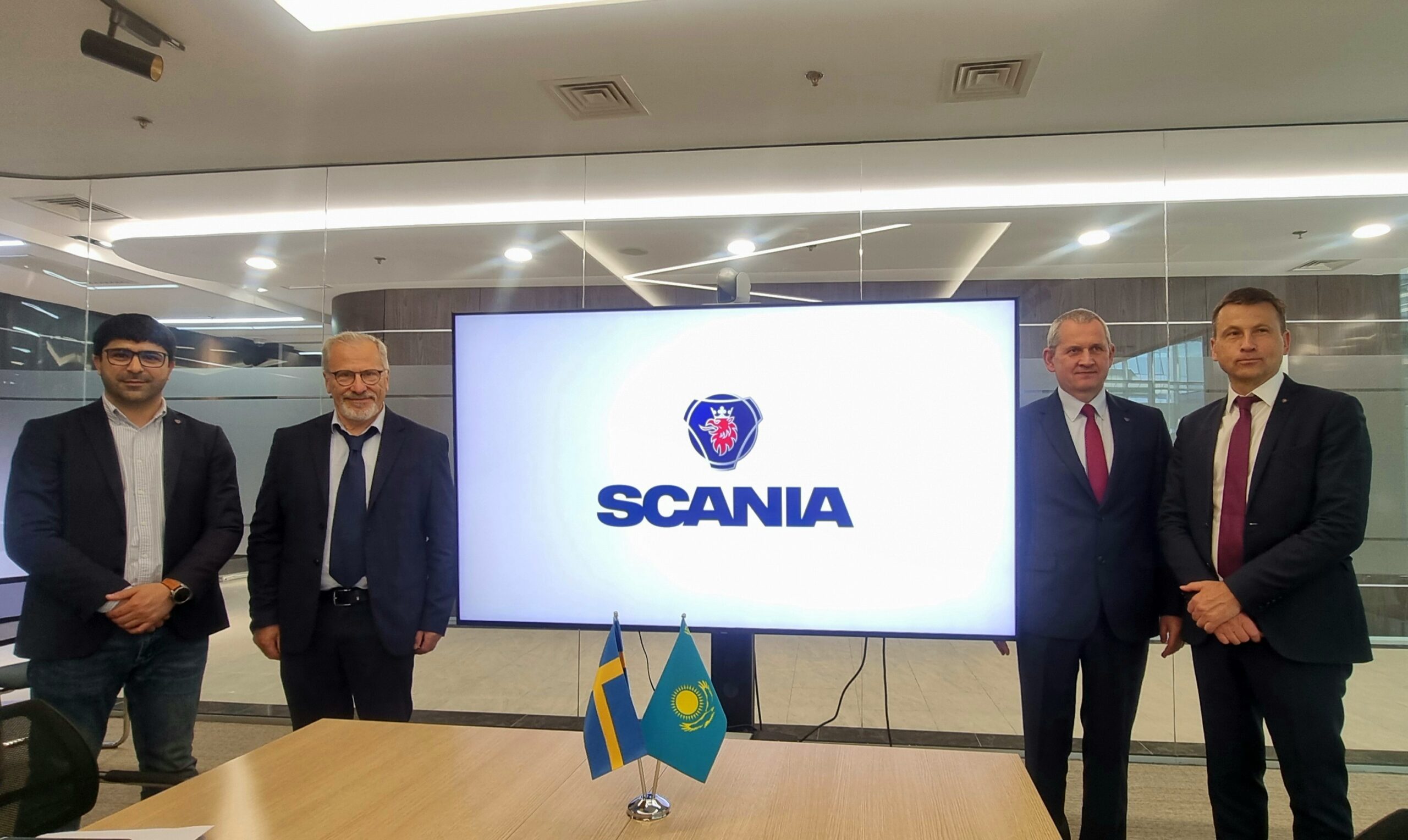ASTANA – The Scania CV AB, a Swedish company specializing in producing industrial and marine engines, trucks, and buses, embarked on a significant endeavor by initiating truck production in Saran, in the Karaganda Region one year ago.

From left to right: Robert Hasanov, Regional after-sales service manager of the Scania Central Asia, Pascal Zappone, Executive vice president of the Scania CV AB, Arthur Safran, Managing director of the Scania Central Asia, Andrey Ovchinkin. Photo credit: The Astana Times.
In an interview with The Astana Times, Pascal Zappone, an executive vice president of the Scania CV AB, provided insights into the company’s presence in Kazakhstan, highlighting the allure of the Kazakh market and outlining future prospects.
“I would say that Scania’s journey in Kazakhstan is quite significant, dating back to 2009 when we first decided to invest in the country. It was during that time that our chairman made the decision to purchase a plot of land spanning 20,000 square meters and proceeded to build a state-of-the-art workshop to Swedish specifications,” said Zappone.
According to him, since then, the company has made substantial investments in training our personnel and a nationwide network to ensure excellent customer service.
“For Scania, providing excellent service to our customers is paramount, and this necessitated significant effort in training and network development, especially considering the vast expanse of Kazakhstan,” he said.
Zappone emphasized that in 2022, they chose Kazakhstan as a hub for Central Asia. Following this decision, in 2023, they further expanded their operations by establishing a regional assembly.
Local assembly: quality and efficiency
The company maintains a global presence with factories in France, Brazil, the Netherlands, and various local assembly plants worldwide, including in South Africa, Tunisia, and Kenya. Consistent quality across all locations is paramount for the company.
“When deciding to open an assembly line in Kazakhstan, several factors came into play. Tax advantages and logistical benefits were significant considerations. Shipping trucks from Sweden to Kazakhstan by road was complex and costly, making local assembly a more practical option. Transporting kits in containers proved simpler and more cost-effective, contributing to the decision for local assembly,” said Zappone.
Within just two to three months of starting production in Kazakhstan, the company was pleased to find that the quality of the trucks met their high standards. This validation of quality instilled confidence in their local assembly operations.
“Initially, the plan was to produce trucks solely for Kazakhstan. However, witnessing the exceptional quality and efficiency of our local assembly process, we decided to extend its use to serve the broader Central Asian region,” he said.
Zappone emphasized that the trucks assembled in Kazakhstan are exactly the same as those assembled in Sweden or Brazil, with no difference in quality. This ensures that top-of-the-line products are assembled locally.
“Scania maintains one brand and one quality globally. We share parts among our factories worldwide, such as the gearbox, which is produced more in Brazil. So Brazil sends the gearbox to Sweden, and Sweden sends the engine, creating a circular product,” he explained.
According to Zappone, starting an assembly line requires more than just physical infrastructure. It demands specialized tools, extensive training, and adherence to stringent quality control processes. In Kazakhstan, specialists from Brazil and Europe were brought in to teach and train specialists and ensure that the assembly process met the same high standards observed in Scania factories worldwide.
“Customers in Kazakhstan were understandably cautious about locally assembled trucks compared to those imported from Europe. However, they soon realized the benefits of local assembly, including easier access to vehicles without the complexities of international logistics,” he said.
Zappone emphasized that Scania’s investment in Kazakhstan goes beyond physical infrastructure. He noted the company’s focus on training teams and dealers to deliver top-notch service. Training has been prioritized across departments to ensure that the organization is equipped with the skills and knowledge needed to provide exceptional service to customers.
Focus on sustainability
Scania has committed to science-based targets aligned with global policies for reducing its carbon footprint, especially in light of initiatives like COP. By 2025, the company aims to achieve a 50% reduction in emissions from both its trucks and manufacturing facilities. To achieve this goal, Scania has implemented various strategies, including the installation of solar panels in most of its facilities to harness renewable energy.
“When it comes to reducing emissions from our trucks, we recognize that there is no one-size-fits-all solution. Instead, we are investing in multiple technologies, including battery electric vehicles (BEVs), electrification, electric buses, and electric trucks. Additionally, we are exploring the potential of alternative fuels such as gas, biogas, and ethanol biofuel. Each of these options offers unique benefits and may be more suitable depending on the country and context,” said Zappone.
“Currently, we have six gas engines in use, and we are launching a new gas engine this month. This diversification of our fuel options allows us to cater to different market needs and preferences while working towards our emissions reduction targets,” he added.
Collaboration shaping the future
“With a strong organization and competent team in place, we are prepared for the future. We aim to expand our business, introduce new solutions such as marine and industrial engines, and produce genset generators. We have already seen Scania engines being used in various applications in Kazakhstan, including ships on the Caspian Sea and mining equipment,” said Zappone.
He emphasized that support from the Kazakh authorities, including the Ministry of Industry and Kazakh Invest, is vital to the company.
“Such assistance has been instrumental in overcoming challenges and accelerating our projects. Unlike other countries, Kazakhstan has demonstrated a willingness to collaborate and support initiatives, making it a positive and conducive environment for business growth,” he said.


